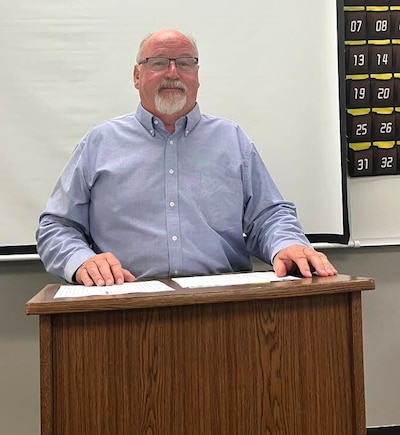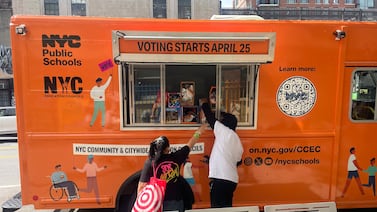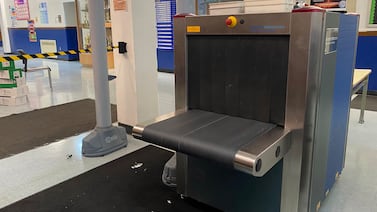Sign up for Chalkbeat Detroit’s free daily newsletter to keep up with the city’s public school system and Michigan education policy.
Civics teacher Mike Powers recognizes that many of the issues his students discuss in class are steeped in emotion. Sometimes those conversations touch on issues of race and racism, gender, and sexuality. Despite the sensitive nature of the policies they debate, Powers takes pride in the fact that his students can be civil with one another.
“I’m not saying it’s easy,” said Powers, who teaches 10th and 11th graders in the Manistique Area Schools district. “Is it easy to bite your tongue and keep your composure? No, it’s not — not even for adults. But they can still make their point by being civil.”
Powers was recently named as a regional teacher of the year by the Michigan Department of Education. He was also a finalist for the statewide teacher of the year for the 2024-25 school year.
The educator has seen teens’ perspectives on politics change over the course of his 40 years in education. Locally, his community has become more conservative in their voting patterns. And in the classroom, Powers said younger students have less of a grasp of what liberalism and conservatism actually mean.
Through class exercises like a survey that helps students understand where their ideologies fall on the political spectrum, Powers said he aims to show that “labels aren’t so important.”
In the process, Powers said the students learn the importance of doing their research and choosing wisely.
“They learn to keep to the issues and not to choose based on emotion or personality,” he said. “They learn to make a smart decision, whatever that is for them.”
This interview has been edited for length and clarity.

Was there a moment when you decided to become a teacher?
I was greatly influenced by my mother who was a great elementary teacher — legendary in my eyes — for over 30 years. Also, my sister and brother were teachers. However, the moment I decided to become an educator was at Western Michigan University. I had transferred there and had changed majors several times. I had the opportunity to volunteer at several schools around Kalamazoo and knew that teaching was the career I wanted to go into.
How do you get to know your students?
I teach in a small school (715 students, K-12), so I know most of the students before they enter my class. However, I have several ice breakers, and activities that help me to get to know the students and the students get to know me.
Tell us about a favorite lesson to teach. Where did the idea come from?
My favorite lesson is usually the lesson I am teaching. However, one that I think is very important and one of my favorites is a lesson I saw in the Detroit Free Press three or four decades ago. I have updated and adapted the lesson annually. The lesson is about political ideology. I have a questionnaire with about 40-50 questions with no right or wrong answers. I read and explain both the questions and the scoring rubric. The students tally up their score. The score relates to a place along the U.S. political spectrum: Populist, Liberal, Moderate, Conservative, and Libertarian. This lesson is a great opportunity to talk about political generalizations and truth in our political system.
In your social studies classes, how are you talking with students about the November election? Have they had any election-related assignments?
Recently, I have had both our Michigan State Sen. Ed McBroom and our Michigan State Rep. David Prestin into my class for general information and questions. We discuss news updates, such as the recent debates. In the past, we have had pretty in-depth candidate forums with local and state candidates, and usually candidates for the U.S. House of Representatives. I make sure all sides of the political spectrum are represented. Also in the past, I have done extensive voter registration and a mock election. For the 2024 election, we are doing just a local candidate forum, voter registration drive, and schoolwide mock election.
What kinds of questions are you getting about the election from your students?
The main questions are about local candidates and ballot proposals. Our county clerk for Schoolcraft County is our local expert. If I do not know an answer, I call her office and get the correct information. Answers to questions and in our political discussions, I make sure to stay right down the center of the political spectrum. I believe a teacher’s job is not to influence any student. A teacher’s job is to encourage the students to think in a critical, academic, and unemotional way. In response to questions as well as discussions, I guide the answers to issues, not personalities, and make sure all sides of the issue are explained.
What was the biggest misconception that you initially brought to teaching?
One misconception was that most students learn the same. To some degree, when I switched from teaching special education to regular education, I thought I would be done with individual education plans. I thought in regular education the individual tailoring of education to match the student’s needs was not necessary. I am glad that was a misconception. Every child learns differently. I believe our educational system is continually improving on that process of individualization.
A second misconception that goes along with the first is that teaching is a “solo” effort. Collaboration with all of the stakeholders is essential, including colleagues, administration, parents, specialty educators, mental health specialists, and many more. It really does take the village.
Recommend a book that has helped you be a better teacher.
“Culturize: Every Student. Every Day. Whatever It Takes” by Jimmy Casas. This is so true. In our classrooms, we should have complete inclusion of all students. As teachers, every single day, we need to bring our passion, enthusiasm, professionalism, and energy to the classroom. All of our students learn differently, teachers need to find what works with each individual student.
What’s the best advice you’ve received about teaching?
The best advice from administration I have frequently received over the years is to communicate with parents/guardians. I agree. The parents/guardians are the most important stakeholders in a student’s life. The teacher and parent/guardian working together are a powerful team!
The best advice from a fellow educator is to “know your students.” A teacher must take the time to know the student’s needs, background, what motivates that student, learning style, and interests. This helps make a strong teacher-student relationship which is so important to our profession.
Hannah Dellinger covers K-12 education and state education policy for Chalkbeat Detroit. You can reach her at hdellinger@chalkbeat.org.





